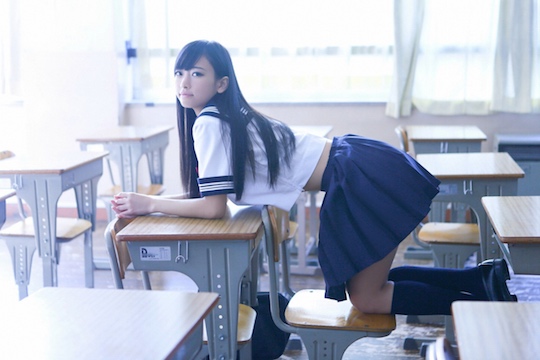Vice seems to have a bee in its bonnet over Japan’s so-called “JK industry” of schoolgirl prostitution.
After its provocative and criticized article and video last year, now it reports on a police crackdown on “businesses that exploit underage girls”.

The article is written by Tokyo Vice (no relation) author Jake Adelstein, who has made a career out of presenting himself as the gaijin expert on all things Yakuza. Recently he has tried to talk a lot about teenager prostitution too and linking it to AKB48, getting a lot of flak for it.
When a UN investigator visiting Japan condemned the country’s lack of effort to deal with the sexual exploitation of children, she made special mention of JK businesses.
JK stands for joshi kousei, or a female high school student. The businesses offer a wide range of services, from simply taking walks with girls to buying sexually provocative photos of them to having sex.
After the investigator, special rapporteur for the United Nations on the sale of children, child prostitution, and child pornography Maud de Boer-Buquicchio, made her claims, the Japanese government demanded that she retract them. But the Tokyo Metropolitan Police Department (TMPD) appears to be reacting somewhat differently — by creating an ordinance to regulate JK businesses in the city of 13 million people.
Police sources admit to VICE News that the businesses are hotbeds of prostitution, and that there have been frequent cases of young girls suffering sexual abuse. In addition, girls often end up graduating from the JK business into the more overt sex industry. Last year, the TMPD raided four JK businesses on suspicion of violations of child welfare laws and other offenses, and subsequently put at least 10 high school girls in protective custody.
The TMPD is apparently now debating the best way to combat the industry. This may result in legislation like the one Aichi Prefecture introduced to combat its local problems with underage female prostitution.
The first business to be punished in Aichi after the law went into effect was Studio Ee in the city of Nagoya, which billed itself as a “Field Trip Club.”
“I thought this level of stuff was okay,” the 51-year-old owner reportedly told police when he was arrested last September. “My sense of it all became dulled.”
At Studio Ee, customers would look at girls through a one-way mirror and choose which girl they wanted to observe more closely. The girls chosen would go to the mirror and pull up their skirts or get on all fours. Some girls would masturbate or simulate masturbation.
To be honest, there have been reports about a police crackdown in Akihabara and Kabukicho at regular intervals for years, much of it addressed at the JK industry, borderline maid cafes, and other dark corners of the districts.
While Aichi is proud of having already investigated and warned many businesses, the new ordinance does not carry much in the way of a penalty.
Violators can have their business operations suspended for up to six months, and repeat offenders can face imprisonment of up to a year or a fine up to about $4,200.
The article has some oddities — editorially, one whole paragraph repeats at the end — but it also highlights our issue with Vice in general. It’s called “Vice” for Chrissakes; it has made its career out of reporting on edgy and criminal things in an exploitative way, so we find it a bit much when it, and Adelstein, try to get on a moral high horse.
We don’t condone underage prostitution but we wonder how useful such moralizing is. We think these things have to put into context. How big is this “industry” really? By reporting so much on it, it creates the impression that men in Japan are disproportionately making use of these services.
Remember, they highlight cases of girls under 18, but they mention a case of a girl aged 17. Well, that’s above the age of consent in most countries (Japan’s own age of consent is ambiguous, though it is below the age of official adulthood, which is 20).
Of course, we don’t have the overall stats on the JK industry either, nor are we in the position to start lecturing other westerners about damaging Japan’s reputation (we are “Tokyo Kinky” after all) — though our power is tiny compared to the likes of Vice. Even so, we can’t help calling out sensationalism when we see it.
For example, the article depends a lot on the judgment of the UN investigator for authority, but she was forced to withdraw some of the things she said as they were too colloquial and sensational.
